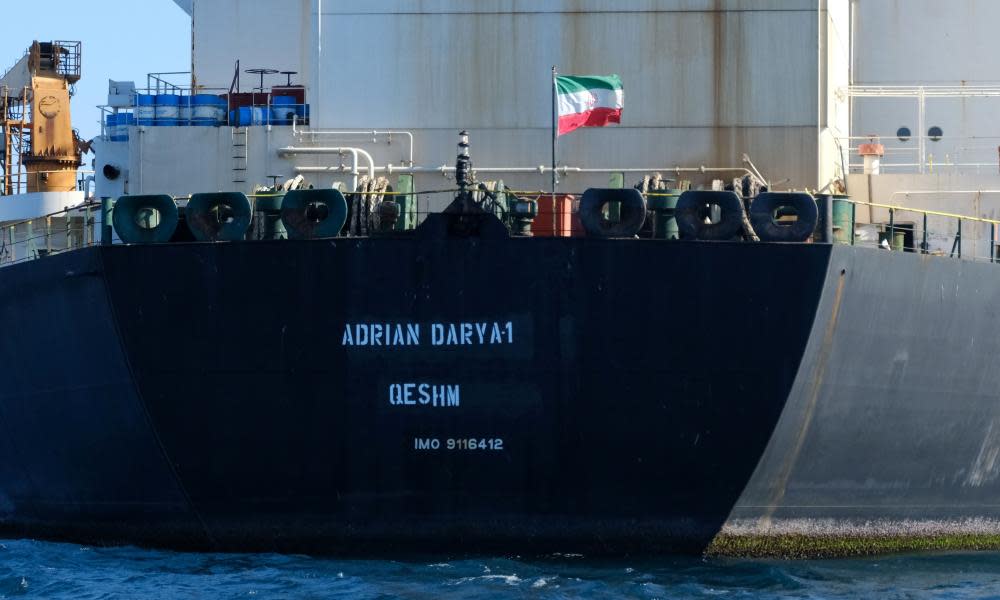UK accuses Iran of selling oil from seized tanker to Syria

Britain has accused Iran of breaching assurances that it would not sell oil to Syria from an Iranian tanker released by authorities in Gibraltar on the condition that the 2.1m barrels it was carrying would not be sold to the “murderous regime” of Bashar al-Assad.
Tehran acknowledged at the weekend that the oil had been sold and the reflagged tanker Adrian Darya 1, previously known as Grace 1, had reached its final destination, after the ship was photographed off the coast of Syria.
Iran, desperate for revenue from oil exports, did not formally confirm the customer was Syria.
The UK foreign secretary, Dominic Raab, summoned Hamid Baeidinejad, the Iranian ambassador to the UK, to a meeting on Wednesday to ask why the assurances given to the Gibraltarian authorities had not been honoured.
In July 2015, Iran and a six-nation negotiating group reached a landmark agreement known as the Joint Comprehensive Plan of Action that ended a 12-year deadlock over Tehran’s nuclear programme. The deal, struck in Vienna after nearly two years of intensive talks, limited the Iranian programme, to reassure the rest of the world that it cannot develop nuclear weapons, in return for sanctions relief.
At its core, the JCPOA is a straightforward bargain: Iran’s acceptance of strict limits on its nuclear programme in return for an escape from the sanctions that grew up around its economy over a decade prior to the accord. Under the deal, Iran unplugged two-thirds of its centrifuges, shipped out 98% of its enriched uranium and filled its plutonium production reactor with concrete. Tehran also accepted extensive monitoring by the International Atomic Energy Agency (IAEA), which has verified 10 times since the agreement, and as recently as February, that Tehran has complied with its terms. In return, all nuclear-related sanctions were lifted in January 2016, reconnecting Iran to global markets.
The six major powers involved in the nuclear talks with Iran were in a group known as the P5+1: the UN security council’s five permanent members – China, France, Russia, the UK and the US – and Germany. The nuclear deal is also enshrined in a UN security council resolution that incorporated it into international law. The 15 members of the council at the time unanimously endorsed the agreement.
On 8 May 2018, US president Donald Trump pulled his country out of the deal. Iran announced its partial withdrawal from the nuclear deal a year later.
Saeed Kamali Dehghan, Iran correspondent
British officials are relatively certain from intelligence assessments that the oil was offloaded on to smaller boats.
British marines seized Grace 1 in July after it entered Gibraltarian waters, claiming the oil was destined for Assad and Syria in breach of EU economic sanctions.
The Foreign Office says Iranian officials gave as many as five different assurances to British officials – including one in writing to Gibraltar’s government – that the ship’s cargo would not go to Syria.
“Iran repeatedly gave assurances to the government of Gibraltar that the Grace 1/Adrian Darya 1 would not deliver oil to any EU-sanctioned entity in Syria or elsewhere. It is now clear that Iran has breached these assurances and that the oil has been transferred to Syria and Assad’s murderous regime,” the Foreign Office said in a statement.
“Iran’s actions represent an unacceptable violation of international norms and the UK will raise the issue at the United Nations later this month.”
Raab said: “Iran has shown complete disregard for its own assurances over Adrian Darya 1. This sale of oil to Assad’s brutal regime is part of a pattern of behaviour by the government of Iran designed to disrupt regional security.
“This includes illegally supplying weapons to Houthi insurgents in Yemen, support for Hezbollah terrorists and most recently its attempts to hijack commercial ships passing through the Gulf.
“We want Iran to come in from the cold, but the only way to do that is to keep its word and comply with the rules-based international system.”
The UK insisted the tanker was seized only in pursuit of EU sanctions policy, and not in support of the US effort to cut off Iranian oil exports, a strategy with which the UK does not agree.
Britain is pursuing a policy of maximum economic pressure on Iran in an attempt to force Tehran to renegotiate the joint comprehensive plan of action, a deal on Iran’s nuclear programme signed in 2015.
Iran has argued it was not a party to the EU sanctions against Damascus, but also said the oil was not destined for Syria. Subsequently, following negotiations both in the Foreign Office in London and in Gibraltar, the British claimed assurances had been given that the oil would not be sold to Syria.
The US attempted to block the departure of the ship from Gibraltar, and US officials then tried to contact the captain of the ship to offer him a substantial sum in return for not selling the oil to Syria but instead taking the ship to a port at which the US could seize the cargo.
The Gibraltar first minister, Fabian Picardo, said in a statement: “It will be a massive volte face for Iran to have failed to live up to its written undertaking in the full glare of international public opinion.
“They will really make themselves look shifty and unreliable if they have acted contrary to their repeated assertions and undertakings.”

